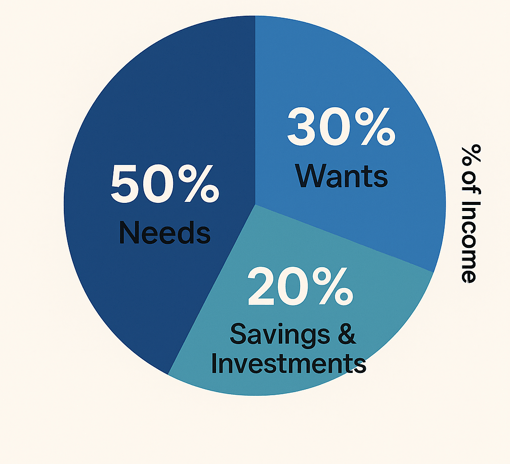The Psychology of Money Explained: Why We Spend, Save & Invest (And Smart Tips for 2025)
We will discover the emotional and physiological reasons behind Spending saving and investing. Learn how to build a long term financial freedom and balance your income wisely.
DIGITAL INNOVATION
5/8/20244 min read


Introduction: Money isn’t just a number
We usually think of money as simple math, like income minus spending equals saving. But deep down, there is a whole psychology behind it. We have a strong emotional and physiological relationship with money. The way we spend, save, and invest is rarely based on logic but mostly on habits, fears, and social influence.
Understanding the psychology of money will enable you to manage your finances, make smart decisions, and build your future according to your goal.
Let’s discover how our behavior is related to the psychology of money and learn how to manage your finances wisely.
Why we spend (instant emotions)
1. The Dopamine Rush
Sometimes purchasing something new or branded activates dopamine which gives us pleasure. It feels good if the item is not necessary.
As Daniel Kahneman says that “People often buy to feel better, not to fulfill a real need”.
2. Social comparison and peer pressure:
Everyone is selling on earth in the form of goods or services. In sales, if you are selling something first the seller creates a need. Now those unnecessary need create social comparison and influence. Seeing friends buying new cars gadgets will also influence you to buy them to keep yourself up.
3. Emotional Spending:
Some portion of our spending is driven by emotions when we are bored, stressed, or sad. We spend money on things which is not a need but for pleasure. I will give some instant tips to control your emotions.
Always think long-term.
Set 24 hours rule before major purchases.
Always buy gadgets with reselling value.
Why We Save: Future-Focused Thinking
Saving does have some pros and cons but still better than unnecessary spending. The main flaw in saving is inflation which devalues your asset with time. We can save for many reasons like:
1. Peace of mind:
Saving acts as a safety net. Whether it’s for job loss or for an emergency the cash reserve will always help you to cope with the situation.
2. Freedom of choice:
Saving is equal to Freedom. You can quit your toxic job, take a career break, or say yes to unexpected opportunities.
3. Building wealth quietly:
Saving will not give you an immediate effect but it will lay the foundation of long-term wealth. Well if we picture it in reality those who invest their savings are the ones who can build generational wealth.
How to save better:
Make a small change but be consistent.
Set a specific goal
Divide your income into three portions expenses, saving, investing.
Why We Invest: Making Money Work for You
1. Beat inflation:
Saving only money will not protect you from inflation but the investment of that saving does. It will help you create wealth and will keep your purchasing power up.
2. Long term wealth creation:
Investments in assets such as stocks, real estate, and crypto can create real wealth. If you have invested 100$ in Bitcoin in 2014 it will 30,000$ today. This is the power of investment at the right time.
3. Achieving Financial Goals:
If you planning your early retirement or want to fund your children’s education investments can drive you there.
Robert Kiyosaki writes in Rich Dad Poor Dad “The rich don’t play for money but money plays for them.
The Perfect Balance: How Much Should You Spend, Save, and Invest?
A popular and very practical rule is 50/30/20 which means 50% for your needs, 30% for yourself like vacation, spending on your hobbies, and 20% saving and investments.
If you can push savings and investments even higher (like 40%), especially in your 20s and 30s, you can build wealth faster.
Steps to Apply It:
Track your income and expenses for 2 months
Categorize the needs, wants, and investments
Cut those unnecessary spending
Automate your saving
Stay updated from the market by visiting our website
How to Invest Wisely:
· Understand your risk
· Diversify your investments
· Stay invested long term
· Avoid emotional decision making, focus on research
· Lean basics of tools and financial instruments such as crypto, ETFs, Mutual funds etc.
· Invest on the platform which promote digital freedom. (read this for more update on digital freedom and privacy measures)
Best Investment Options for 2025
Here are some smart and diversified ways to invest your money in 2025:
Yourself: The first best investment is on yourself it could be in a form of Courses, skills, and certifications which will offer some of the best returns in the form of higher income.
Stock Market (ETFs and Blue-Chip Stocks): Diversified exchange-traded funds and stable large-cap companies remain strong for long-term growth.
Real Estate: Consider rental properties or REITs (Real Estate Investment Trusts) for passive income.
Cryptocurrency (with caution): Bitcoin, Ethereum, and top altcoins can offer high returns but require careful research.
Government Bonds or Mutual Funds: Safer and ideal for risk-averse investors looking for moderate, consistent returns.
Peer-to-Peer Lending: Lend money to individuals or businesses through regulated platforms and earn interest.
Dividend Stocks: Invest in companies that regularly share profits with investors.
Gold and Precious Metals: A traditional hedge against inflation and economic uncertainty.
Index Funds: Low-cost, long-term investment tools tracking market indices like the S&P 500.
Online Businesses or Startups: Invest in small online ventures or tech startups for higher risk-reward potential.
Money is a Mirror of Mindset:
Most financial success comes down to behavior, not income. Two people earning the same salary can have different futures depending on how they manage their money.
“It’s not what you earn. It’s what you keep, save, and grow that matters.”
If you find this blog helpful subscribe for free for such updates every week.
Written by Hassan Abdullah
Digital researcher
Islamabad
FAQs or Common Questions


Thinky Talks
Stay updated on crypto, blockchain, and innovation.
© 2025. All rights reserved.
